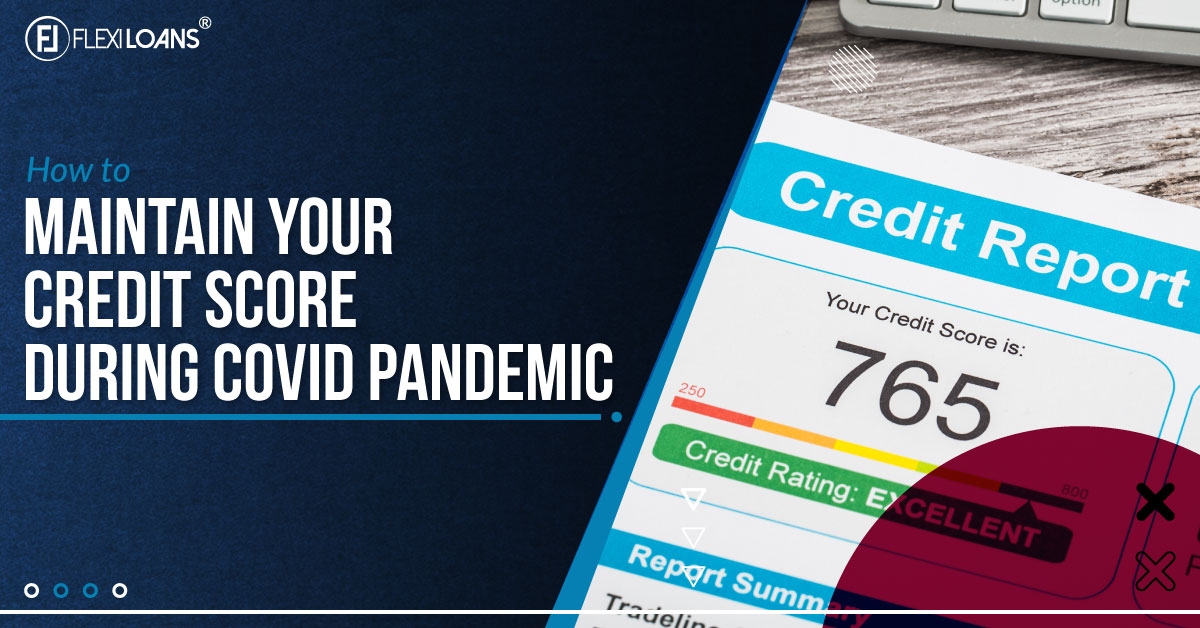Jan 18, 2022
Feb 13, 2026

The Covid-19 pandemic ravaging the world for the past two years has played havoc on peoples’ lives economically. The government-imposed national lockdown to thwart the spread of the virus has overthrown everybody’s financial plans.
The coronavirus mayhem led to the abrupt closure of businesses, loss of jobs, pay cuts, deaths due to the virus, and overall instability in our lives. The Reserve Bank of India (RBI) rolled out a moratorium on term loan repayments for three months without affecting our CIBIL scores at the beginning of the pandemic in 2020. The moratorium was extended to borrowers to aid them in handling the financial stress to some extent.
In the current situation, you might be concerned about how to maintain a CIBIL score amid this turbulence. It is a genuine concern, as the coronavirus crisis is only aggravating everyone’s financial needs and losses. As the family’s sole earning member, you may need a collateral-free loan or a business loan. Therefore, it would be best if you knew what a good CIBIL score is, which will enable you to obtain a loan during a crisis.
What is a CIBIL Score? Why is it Important?
The Credit Information Bureau (India) Limited (CIBIL) is a credit information organization licensed by the Reserve Bank of India. It collates all credit-related information of borrowers all over India and maintains credit files for each of them. When you secure a personal or MSME loan, its data gets registered with CIBIL.
CIBIL maintains your credit file and represents your credit performance through a three-digit CIBIL score. It is the summary of your creditworthiness, ranging between 300 and 900. The higher you score on CIBIL, the better are your chances as a prospective borrower.
The CIBIL score is critical for any person looking for loans. Whether a personal or business loan, the eligibility depends on how much you score in CIBIL.
What is a Good CIBIL Score in India?
The CIBIL scores range between 300 and 900. If you score 700+, you will be considered creditworthy. A score of 900 on CIBIL is deemed to be excellent. However, please note that institutions also sanction loans after factoring in your income, documents, etc,. and not solely on your CIBIL score.
If you are an entrepreneur and are looking for an unsecured business loan, you can search the market for an institute offering the most attractive business loan interest rates.
You can visit the official website of any lending institution to assess your business loan eligibility. The eligibility criteria for all categories of loans like collateral free business loan, MSME loan, etc., are mentioned there.
Taking a loan will directly impact your cash flow. Hence, it would be best to assess the business loan interest rates you need to pay by accessing the online business loan EMI calculator. This calculator will calculate you the EMI amount you need to pay every month.
Impact of CIBIL Score in Covid Times
Amid the pandemic, loss of income due to closure of businesses, loss of jobs have become commonplace incidents. You may be already servicing a loan for business or a Mudra Loan. It will be a challenge to run your business, meet all essential expenses, and maintain your CIBIL score.
The government had offered a moratorium on loans until August 31, 2020. If you opted for that, you will not be required to pay installments during that period; the interest accrued during that period shall get levied onto you at a later stage. Unless you pay the overdue interest, your CIBIL score will be affected.
How to Maintain CIBIL Score in Pandemic at an Acceptable Level?
You need to know the following to maintain your CIBIL score amid the pandemic:
Know Your CIBIL Score
You need to know your credit score and the integral constituents that get factored in in calculating your creditworthiness. It would be best to take adequate remedial measures to improve your CIBIL score. A good score will help you when you need additional funds over the long run. Try and regularize your payments within a CIBIL Score update period, a window of 30-45 days within which credit institutions submit data to CIBIL.
Keep Checking Your Credit Report
It would be best to monitor your credit score in these uncertain times regularly. Keep checking with CIBIL and take corrective measures if you see your score is going down due to some irregularities in repayment of dues. Please note that your credit score signifies how good you are in the repayment of loans. If you compromise on your credit score, it will be challenging to obtain loans for any future requirement.
Clear Credit Card Debts
Paying off your credit card dues during this crisis period is very important. By carrying on this high-interest debt, there is a chance of you falling into a trap, thereby tarnishing your credit score.
If you feel it is becoming an issue in clearing off the entire due, you may contact your bank that has issued the credit card and go for a settlement.
Consolidate Debts
If you apprehend any untoward incident that might result in you missing repayments for the next few months, it is ideal to go for debt consolidation. It is better to close multiple high-interest loan accounts and consolidate the debt into one loan account with a lower interest rate. You may decide to go for a longer loan tenure to keep the EMI at a manageable level.
Try And Avoid Moratorium
The moratorium that was offered during the pandemic came with an implied clause. By opting for a moratorium, you were not supposed to pay installments till August 31, 2020. But, there was no relief on the interest repayment. The accrued interest was always liable to be paid by you eventually. You should only opt for the moratorium if your income has reduced in real terms and you do not have enough reserves to meet essential expenses. But, let opting for a moratorium be your last resort as overdue interest burden would start bleeding you in due course of time.
Avoid Cash Withdrawals From Credit Cards
You are advised not to withdraw cash using your credit card. The cash withdrawal on your credit card comes with additional charges like cash advance fee and late payment fees. As the repayment amount of the credit card will come in with additional fees, it has an adverse effect on your credit score.
Keep A Check On Your Credit Utilization
Financial institutions prefer profiles who use their credit limits with prudence. You are advised to refrain from overspending and stick to essentials only during these trying times. In an ideal situation try and maintain your credit utilization within 30 percent of the limit available to you.
Few Takeaways
- Credit score is a numerical representation of your creditworthiness.
- You need to maintain a healthy credit score so that whenever you may need additional funds for your business, the same may be sought from any lending institution.
- In India, a score of 700+ in CIBIL is considered to be an acceptable score.
- You need to be extra cautious to maintain your credit score in this pandemic situation.
- For maintaining your own credit score, you need to know your CIBIL score.
- You need to keep checking your credit score periodically to maintain acceptable standards.
- It is advisable to clear your high-interest credit card debts as soon as possible. Also, you may opt for a debt consolidation initiative by bringing all your high-interest debts under a single umbrella.
- Avail the loan moratorium offer as a last resort. The overdue interest that will accrue for the months when the moratorium is in force will eventually be added on to your debt burden.
- Refrain from making cash withdrawals from credit cards as they come with cash advance fees and fetch high interest on repayment.
- Keep your utilization of your available credit limit to 30 percent.
It would be best to keep in mind that life goes on, however adverse the situation may be due to the pandemic. You need to sustain your business and look for growth opportunities. Therefore, it is essential not to lose sight of the basic hygiene factor that is a major driver in your business pursuits. One of the most critical indicators that lending institutions look for in you is your creditworthiness. You need to ensure that the credit score you have built up for yourself gets maintained from what may.







